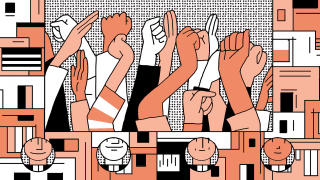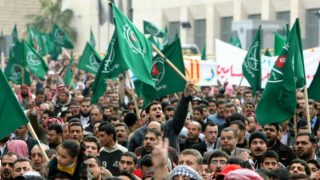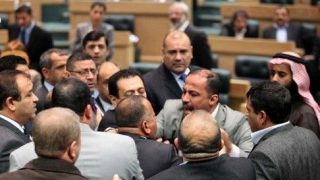Violence in Jordanian universities has claimed the lives of five people this year and turned campuses into battlefields, where all sorts of available murder tools have been used — from stones, knives, daggers and sticks to Molotov cocktails, guns and automatic weapons.
This said, it is certain that the universities — whether public or private (around 25 universities) — will not enter The Guinness Book of World Records for their brilliant academic success. According to the 2012 rankings of Webometrics, the best university in Jordan was ranked 13th in the Arab world and occupied rank 1,310 on a global scale. Yet, Jordanian universities just might enter Guinness for their violence, and not for their spending on scientific research, in a country that dedicates only 0.45% of its GNP to this field.
Unofficial statistics recorded over 50 university clashes between Jan. 1 and the end of April. The president of The National Campaign for Defending Students' Rights (Thabahtoona) reported 30 clashes in March and April. The report issued by Thabahtoona in 2012 recorded 80 clashes in Jordanian universities, in addition to those that broke out in secondary schools and faculties.
Universities drenched in blood
After failing to deal with these battles and control them, university security has resorted to the general security forces and gendarmerie, which are forbidden by law from entering campuses.
On March 31, a conflict between two students affiliated with two different tribal movements in Mutah University, located in Karak governorate (120 kilometers [75 miles] south of Amman), turned into a fight with firearms and Molotovs. The tribes supported their partisans from outside the university with men and arms.
The clashes ended with the death of a student in the faculty of engineering, who suffocated from tear gas that was thrown by the gendarmerie forces to split up the fighting parties. Courses were suspended and a period of mourning was declared. The brawl was solved through a temporary tribal truce, and charges were filed against an unknown person.
Yet, the catastrophe was not in Mutah, but in Al-Hussein Bin Talal University in Maan governorate (216 kilometers [134 miles] south of Amman) on April 29, when a normal university day turned into an open battle that involved the use of firearms brought by the students to campus.
Four people, including a faculty member, died, and the university closed its doors until May 26. The battle even spilled over to the entire governorate. The clashes were first restricted to students belonging to two tribal movements of the same governorate, but they soon saw the involvement of tribes with all their components and armed forces.
Roots of university violence
Al-Hussein Bin Talal University shed light on the deeply rooted phenomenon of university violence, after years of deliberate negligence and attempts to deny its existence from officials. A tribe is considered the driving force in the university communities. Moreover, Jordanian universities have become backyards for tribalism, in a clear reflection of the increasing forms of people’s social retreat to their primary reference — that of family, tribe and faction.
This regression was the result of an official approach that aimed at encouraging political participation within scholarly communities — a participation that culminated in the 1970s during the phase of double political polarization by Palestinian organizations operating in Jordan and secretive Jordanian movements.
The official policy succeeded in its endeavors: After two decades of flourishing political activity in universities, calm returned to the campuses, and the presence of scholar movements with political goals declined, thus leaving a void that was filled with tribal and regional inclinations. It is noteworthy that the clashes are further ignited by the location of Jordanian universities within regions of tribal power. Each university believes that it has the absolute right to benefit from its teachers and employees.
Students who are affiliated with tribes work hard at competing to impose the control of their tribes on the university, especially during the elections of student councils.
University violence is expanding, while officials reiterate that “violence should not be protected by a tribe” and present secondary reasons to define the phenomenon and develop a solution to it.
Emergency plan
The Higher Education Council in Jordan announced a several-point conclusive emergency plan to face university violence. The plan consists of creating awareness based on dialogue in universities, reconsidering university legislation and activating already dysfunctional sanctions. Moreover, the plan revealed the weakness of the performance of university security and the inexperience of the student affairs’ staff in dealing with the quarrels. Thus, a training program was put in place. Each university will be turned into a security fortress that is supervised by cameras — inside and outside — and employment opportunities after graduation will be linked to behavior on campus.
Yet, the irony lies in the solutions suggested by several MPs to deter university violence during a session that was held to discuss the phenomenon. After analyses and explanations, the MPs suggested imposing a uniform on students, forbidding women from wearing makeup and enforcing religious values. Some went so far as to demand the reintroduction of compulsory military service that had been halted since the mid-1990s and to make it an admission requirement to university because it “builds men,” as they said.
Outside the official box
Thabahtoona’s statistics indicate that 90% of university clashes erupt in the faculty of human sciences, whose students are the least educated in public secondary schools. They usually reach universities through bribes (like quotas for the underprivileged, children of members of the army, and children of staff and employees). In spite of that, the education council still refuses to reconsider university admission requirements as part of its plan.
Moreover, the plan has disregarded the demands of parties, civil-society organizations and campaigns defending the rights of students to participate in the university political life and lift the security grip off them to recreate a suitable university environment that puts an end to the students’ resorting to regional and tribal references.
Lifting the security grip and allowing political action is a dream that seemed realizable when King Abdullah II asked the security forces to keep their hands off universities for a period of 10 days, during his meeting with a group of young activists in early 2011. Two years later, we are still awaiting those royal 10 days, while security intervention persists.
Translated by Al-Monitor




